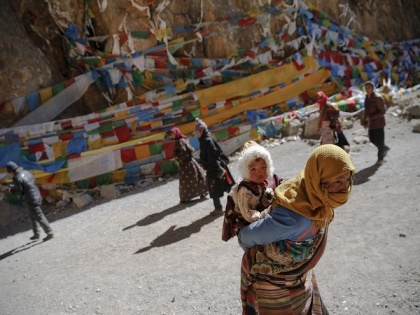China's militarized vocational training practised in Xinjiang reaches Tibet: report
By ANI | Published: September 25, 2020 01:43 PM2020-09-25T13:43:55+5:302020-09-25T14:00:07+5:30
Rural labourers in Tibet are now being forced into military-style training camps similar to the one built and run for years by the Chinese government in the Western Xinjiang Region, according to a US-based think tank.

China's militarized vocational training practised in Xinjiang reaches Tibet: report
Rural labourers in Tibet are now being forced into military-style training camps similar to the one built and run for years by the Chinese government in the Western Xinjiang Region, according to a US-based think tank.
Researcher Adrian Zenz writing in the report published by the Washington-based research and analysis group The Jamestown Foundation says that the training which ran for years in Xinjiang with the aim to reform "backward thinking" and to promote systematic, centralized, and large-scale training has reached Tibet.
The report titled 'Xinjiang's System of Militarized Vocational Training comes to Tibet' says that the Tibet Autonomous Region (TAR) has introduced policies to promote large-scale training and transfer of "rural surplus laborers" to other provinces of the People's Republic of China (PRC) in between 2019 and 2020.
As per the report, this scheme consists of Tibetans of all ages and is distinct from the coercive vocational training of secondary students and young adults.
The labour transfer policy says that farmers are to be subjected to centralized "military-style" vocational training, which aims to reform "backward thinking" and includes training in "work discipline," and law.
"Documents from the Poverty alleviation reports state that Tibetans are to be transformed from [being] unwilling to move to become willing to participate, a process that requires diluting the negative influence of religion," Adrian wrote.
Moreover, the scheme "encourages" Tibetans to hand over their property to government-run cooperatives, turning them into wage labourers. As per the report, the scheme is aimed to achieve Chinese President Xi Jinping's goal of eradicating absolute poverty.
According to Adrian, this vocational scheme displays close similarities to the system of "coercive vocational training and labour transfer established in Xinjiang."
"...both schemes have the same target group; a high-powered focus on mobilizing a reticent minority group to change their traditional livelihood mode; employ military drill and military-style training management to produce discipline and obedience; emphasize the need to transform laborers' thinking and identity, and to reform their backwardness; teach law and Chinese; aim to weaken the perceived negative influence of religion; prescribe detailed quotas, and put great pressure on officials to achieve program goals," he wrote.
Other similarities to Xinjiang's transfer scheme include unified processing, strong government involvement, and financial incentives for middlemen.
In both cases, government documents make it clear that poverty alleviation is a "battlefield," with such work to be orgzed under a military-like "command" structure.
As in the case of Xinjiang's Uyghurs, overcoming Tibetans' resistance to labor transfer is at the core of the entire mechsm.
"Documents state that the strict military-style management of the vocational training process causes the masses to comply with discipline, continuously strengthens their patriotic awareness, and reforms their backward thinking. This may also involve the presence of local cadres to make the training discipline stricter," the report stated.
Adrian further stated that both Xinjiang and Tibet, state-mandated poverty alleviation consists of a top-down scheme that extends the government's social control deep into family units.
He argued that both regions have by now implemented a comprehensive scheme that relies on centralized administrative mechsms; and a militarized training process that involves thought transformation, patriotic, and legal education.
( With inputs from ANI )
Disclaimer: This post has been auto-published from an agency feed without any modifications to the text and has not been reviewed by an editor
Open in app